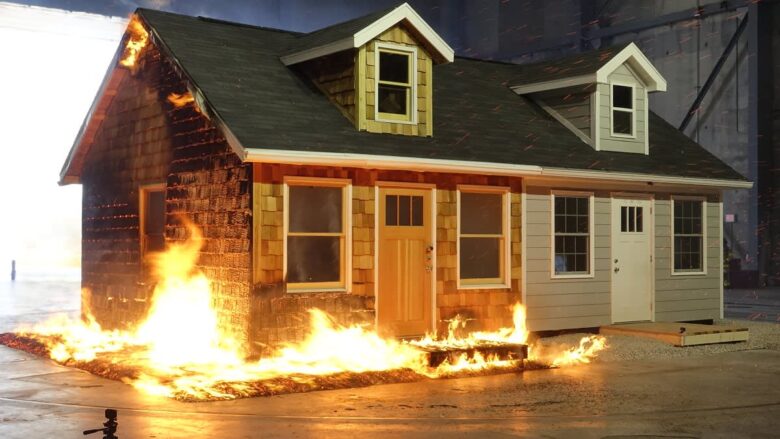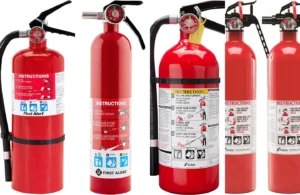This is because house fires have become a bigger risk in recent years. It’s more important than ever to make sure your home is fireproof, with more electrical tools, flammable materials, and unpredictable weather. Taking preventative steps and keeping up to date can greatly lower the chance of fire-related disasters.
Learning About Fire Risks
There are many things that can cause house fires, such as electrical problems, cooking accidents, smoking materials, and heating tools. Knowing about these possible dangers is the first thing that can be done to stop fires from starting.
Looking at the weak spots in your home
Do a full inspection of your house to find any possible fire hazards. Look for signs of wear and tear in the outlets, cords, and tools. Make sure that places that tend to get hot, like attics and crawl spaces, have enough air flow.
Important steps for fire safety
Put fire extinguishers in key areas of your home, like the kitchen and garage, and buy smoke alarms to find fires early. Check and fix electrical systems on a regular basis to avoid short circuits and burning. Store explosive things, like gasoline and propane, in specific places that aren’t near anything that could start a fire.
Building and materials that don’t catch fire
When you build or fix up your home, choose elements that won’t catch fire, like brick, stone, and metal. Put in windows and doors that won’t catch fire to stop the fire from spreading quickly. To make the structure stronger, you might want to add fire barriers like fire-rated plywood.
Making ways to get away
Make a detailed exit plan for your family that includes more than one way to get out of each room. For upper-story windows, put up fire escapes and ladders and make sure they are easy to get to. Hold regular fire drills to make sure everyone knows what to do in an emergency.
Gardening and Keeping Fires Out
Keep the area around your house safe by getting rid of dead plants and other junk. When you’re landscaping, choose plants that won’t catch fire and stay away from mulch and wooden buildings that can catch fire.
Getting Your Family Smart
Teach your family about fire safety, such as how to use fire extinguishers and get out of the house safely in case of a fire. Fire drills are a great way to make sure that everyone knows what to do in an emergency and to practice these skills.
Keeping up with news and getting ready
Keep up with the local fire risks and weather factors that could make wildfires or house fires more likely. Make sure you have an emergency plan with escape routes, emergency contacts, and a place to meet up.
Thoughts on Insurance
Check your homeowner’s insurance to make sure it covers enough damage from a fire. Know what your policy doesn’t cover or what it limits, and if you need to, think about adding more coverage.
Evaluation and help from professionals
You might want to hire a fire tester or consultant to look at your home’s fire safety measures and suggest ways to make them better. Ask firefighters or the local government for help on how to keep your area safe from fire.
Participation and readiness in the community
Take part in fire safety programs in your community, like neighborhood watch programs and classes on how to avoid starting fires. Set up ways for you and your friends to talk so that you can share important information and plan how to handle emergencies.
Fireproofing options that won’t break the bank
Installing door and window seals, upgrading to fire-resistant roofing materials, and adding insulation to stop heat movement are all low-cost ways to make your home fireproof.
Common False Ideas and Myths
Busting common fire safety myths, like the idea that do-it-yourself fireproofing methods don’t work or that fires don’t behave the way they’re supposed to can help make sure that homes take the right safety measures.
In conclusion
To sum up, fireproofing your home is important to keep your family and belongings safe from the terrible effects of house fires. You can lower the chance of fire-related disasters and keep your family safe by learning about fire hazards, taking precautions, and staying up to date….
1. How often should I check my smoke alarms?
At least once a month, test your smoke alarms and change the batteries every year to make sure they are working right.
2. Are there any fire safety steps that are designed to work with older homes?
Some older homes may need extra fire safety steps, like having their electrical systems updated, fire-resistant insulation put in, and doors and windows made of fire-rated materials.
What if I don’t have a lot of money to protect my house?
Yes, there are many fireproofing options that won’t break the bank. For example, you can seal gaps around doors and windows, use heat-resistant materials, and keep your living area clean and free of clutter.
4. How can I teach little kids how to stay safe around fire?
For young kids, use books and movies that are right for their age to teach them about fire safety. Do fire drills with your family and stress how important it is to stay low to the ground and crawl to safety in case of a fire.
5. What should I do if my house catches on fire?
If there is a fire in your house, you should put your safety first and leave right away. Once you are safe outside, call 911. Do not go back inside the building until firemen say it is safe to do so.



